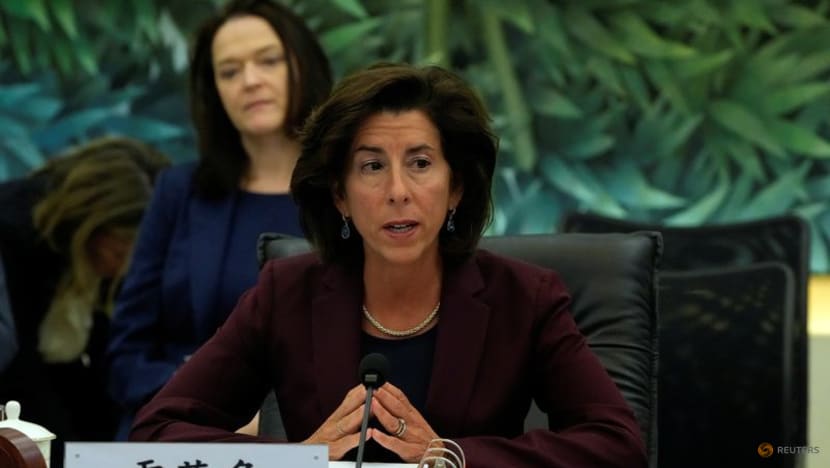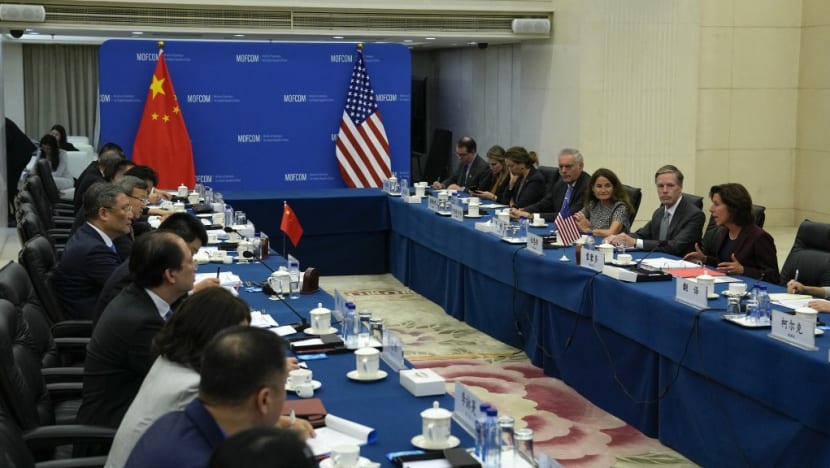US commerce secretary says crucial to have stable economic ties with China
It is "profoundly important" for the US and China to have a stable economic relationship, says US Commerce Secretary Gina Raimondo during a visit to Beijing.

US Commerce Secretary Gina Raimondo speaks during a meeting with her Chinese counterpart Wang Wentao, at the Ministry of Commerce in Beijing on Monday, Aug 28, 2023. (Photo: Andy Wong/Pool via REUTERS)
BEIJING: US Commerce Secretary Gina Raimondo opened talks with Chinese government officials on Monday (Aug 28), saying it is "profoundly important" for the world's two largest economies to have a stable economic relationship.
Raimondo is looking to boost business ties as US firms have reported increasing challenges with operating in China, while China has sharply criticised US efforts to block its access to advanced semiconductors.
Raimondo said the entire world expects the United States and China will have a stable economic relationship. The two countries share more than US$700 billion in annual trade.
"We share US$700 billion dollars of trade and I concur with you that it is profoundly important that we have a stable economic relationship," she said, according to a readout from the US Commerce Department.
"It's a complicated relationship. "It's a challenging relationship. We will of course disagree on certain issues," Raimondo said. "I think we can make progress if we are direct, open and practical."

Raimondo arrived in Beijing on Sunday and was met by Lin Feng, the director of the commerce ministry's Americas and Oceania department, as well as US Ambassador to China Nicholas Burns.
During her trip, she will also travel to China's economic powerhouse Shanghai, the US Commerce Department said. She will leave on Wednesday.
Her visit is the latest in a series of high-level trips to China by US officials in recent months as Washington works to cool trade tensions with Beijing.
The trips could culminate in a meeting between their leaders, with US President Joe Biden saying recently that he was expecting to sit down with China's Xi Jinping this year.
China's Commerce Minister Wang Wentao said US-China economic relations matter not just to the two countries, but also the rest of the world and expressed appreciation for Raimondo's remarks that she likes trade with China.
He said he was ready to work together to "foster a more favourable policy environment for stronger cooperation between our businesses to bolster bilateral trade and investment in a stable and predictable manner".
Raimondo said the United States and China have "worked over the summer to establish new information exchanges and working groups that will enable us to have more consistent engagement in our relationship".
EFFORT TO MAKE ECONOMIC RELATIONS MORE CONSTRUCTIVE
Raimondo and her counterpart also agreed to set up a working group on commercial issues, which will allow US and Chinese officials and business representatives to talk. The group is expected to meet twice a year.
"This is an effort to make the relationship more constructive and less combative, and we are on hopefully a step towards doing that, and at least putting a floor under US-China economic relations," Steven Okun, senior advisor at international trade consultancy McLarty Associates, told CNA938 on Tuesday.
He pointed out that the relationship has been on a downward trajectory since 2015, when China announced its "Made in China 2025", a state-led industrial policy that outline China's ambitions to dominate in global high-tech manufacturing.
While there were other avenues for talks between the two sides previously, what is different now is that both countries have issues with each other like protectionism, subsidies and industrial policy, so it would be a two-way engagement, he said.
He noted that the forum will be a good place for the Chinese to understand with the US means by "de-risking", he noted.
"This dialogue has never occurred before. So let's see if this can be helpful in having China better understand what the US is trying to do and see if it agrees or disagrees with those steps," he said.
TRADE TENSIONS
Relations between the United States and China have plummeted to some of their lowest levels in decades, with US trade curbs near the top of the laundry list of disagreements.
Washington says they are crucial to safeguarding national security, but China sees them as seeking to curb its economic rise.
This month, Biden issued an executive order aimed at restricting certain US investments in sensitive high-tech areas in China - a move Beijing blasted as being "anti-globalisation".
The long-anticipated rules, expected to be implemented next year, target sectors such as semiconductors and artificial intelligence.
US Treasury Secretary Janet Yellen sought to reassure Chinese officials about the expected curbs during a visit to Beijing last month, promising that any new moves would be implemented in a transparent way.
Raimondo has declared off-limits any discussion of US export curbs aimed at slowing Beijing's military advances.
"Of course of matters of national security, there is no room to compromise or negotiate," she said, adding the vast majority did not impact national security concerns.
"We believe a strong Chinese economy is a good thing," she said.
"We seek healthy competition with China. A growing Chinese economy that plays by the rules is in both of our interests."
At an event later on Monday, Raimondo showed off a number of personal care products made by US companies and sold in China to make the case that trade can flourish outside products with national security implications, and said 99 per cent of trade between the two countries is unrelated to export controls.
"No one can argue that health and beauty aids interfere in our national security," she said. "The plan, and the hope, is that our commercial relationship, if done right, can stabilise the political relationship."















